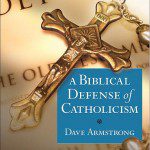
John 3:5 (RSV): “Jesus answered, ‘Truly, truly, I say to you, unless one is born of water and the Spirit, he cannot enter the kingdom of God.’”
Acts 2:38: “And Peter said to them, ‘Repent, and be baptized every one of you in the name of Jesus Christ for the forgiveness of your sins; and you shall receive the gift of the Holy Spirit.’”
Acts 22:16: “And now why do you wait? Rise and be baptized, and wash away your sins, calling on his name.”
1 Corinthians 6:11: “And such were some of you. But you were washed, you were sanctified, you were justified in the name of the Lord Jesus Christ and in the Spirit of our God.”
Titus 3:5: “he saved us, not because of deeds done by us in righteousness, but in virtue of his own mercy, by the washing of regeneration and renewal in the Holy Spirit,”
1 Peter 3:19-21: “in which he went and preached to the spirits in prison, who formerly did not obey, when God’s patience waited in the days of Noah, during the building of the ark, in which a few, that is, eight persons, were saved through water. Baptism, which corresponds to this, now saves you, not as a removal of dirt from the body but as an appeal to God for a clear conscience, through the resurrection of Jesus Christ,”
Baptismal regeneration is understood by Catholics (and Orthodox, Lutherans, traditional Anglicans, Methodists and some other Protestants, in a basic agreement) to mean a spiritual rebirth (what many evangelicals call being “born again”). Just as a human being must be physically generated to enter the world, he must be spiritually regenerated to enter the kingdom of heaven. The passages above constitute the major scriptural reasons why the great majority of Christians for two thousand years have accepted this belief, and accept baptism as a sacrament: a physical means to convey God’s grace.
Protestants who deny baptismal regeneration (Baptists, Presbyterians, many Pentecostals, and others) place spiritual regeneration at the point of personal conversion or a decision to become a disciple of Jesus. Some still practice infant baptism, but deny that it regenerates. Most groups that practice only adult baptism deny that it regenerates, but some (such as the Church of Christ) believe in an adult (“believer’s”) baptism that also regenerates. The passages presently under consideration make the “non-regeneration” position difficult to accept, since they associate baptism directly with salvation.
Even Martin Luther substantially agrees with the position of the Catholic Church:
Little children . . . are free in every way, secure and saved solely through the glory of their baptism . . . Through the prayer of the believing church which presents it, . . . the infant is changed, cleansed, and renewed by inpoured faith. (The Babylonian Captivity of the Church, 1520, in Steinhauser, 197)
[E]xpressed in the simplest form, the power, the effect, the benefit, the fruit and the purpose of baptism is to save . . . [T]hrough the Word, baptism receives the power to become the washing of regeneration, as St. Paul calls it in Titus 3:5 . . . [F]aith clings to the water and believes it to be baptism which effects pure salvation and life. (Large Catechism, 1529, sections 223-224, p. 162)

















